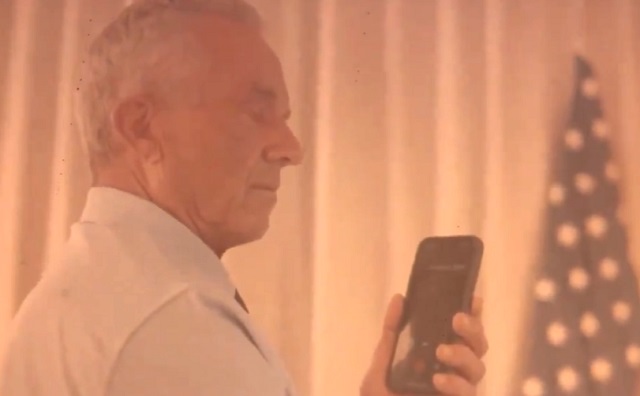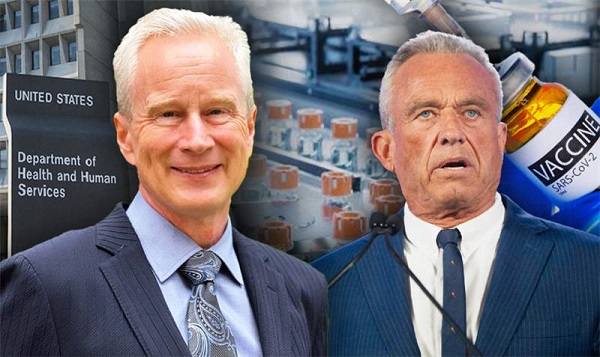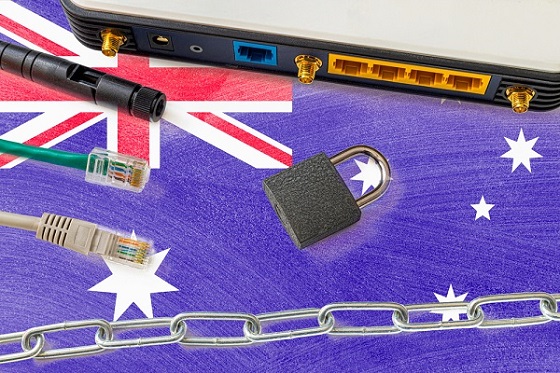Health
Leaked footage shows Trump questioning childhood vaccines in phone call with RFK Jr.

Robert F. Kennedy Jr. speaks with Donald Trump.
From LifeSiteNews
The former president appears to admit that childhood vaccination can lead to injuries during a Sunday phone call with Robert Kennedy Jr., the footage of which was originally leaked by Kennedy’s son.
The son of independent presidential candidate Robert F. Kennedy Jr. recently leaked footage online of his father’s phone call with Donald Trump during which the former president questioned childhood vaccines.
Holy cow. Leaked RFK Jr. call with Trump, talking about vaccines. I hope Trump puts him in charge of shutting down the CDC, FDA corruption.
— Liz Wheeler (@Liz_Wheeler) July 16, 2024
At the beginning of the video clip, Trump can be heard saying, “I agree with you, man. Something’s wrong with that whole system, and it’s the doctors you find. Remember I said, ‘I want to do small doses.’”
“When you feed a baby, Bobby, a vaccination that is like 38 different vaccines, and it looks like it’s meant for a horse, not a, you know, 10-pound or 20-pound baby … and then you see the baby all of a sudden starting to change radically. I’ve seen it so many times,” Trump continued.
“And then you hear that it doesn’t have an impact, right? But you and I talked about that a long time ago,” the former president added.
The leaked footage shows that Trump holds to a stance of skepticism about childhood vaccination that he was publicly known for before the COVID shot rollout under his administration’s Operation Warp Speed. For example, in 2017, Trump was criticized for a statement he made in 2015 linking vaccines to autism: “People that work for me, just the other day, two years old, beautiful child went to have the vaccine and came back and a week later, got a tremendous fever, got very, very sick, now is autistic,” Trump said at the time.
In 2014, Trump tweeted, “Healthy young child goes to doctor, gets pumped with massive shot of many vaccines, doesn’t feel good and changes – AUTISM. Many such cases!”
Kennedy’s son, Robert F. Kennedy III, who posted the footage online early on Tuesday, reportedly said in his X post that he wanted to show Trump’s “real opinion” on vaccination, but has since deleted the clip, according to the BBC.
It is noteworthy that while Trump admits that at least certain doses and kinds of childhood vaccines lead to autism and potentially other health problems, he has consistently defended Operation Warp Speed’s rollout of novel “vaccine” technology in the face of grievances that it has caused many deaths and serious health issues. Since leaving office, he repeatedly promoted the jab as “one of the greatest achievements of mankind.” In January 2023, he dismissed potential safety issues by suggesting that “problems” were in “relatively small numbers.”
It is little discussed, however, that while Operation Warp Speed was technically an initiative of the Trump administration, a significant number of the players involved clashed with the White House, as Politico has revealed. In fact, White House Coronavirus Task Force members were reported to have been excluded from early Warp Speed discussions.
A former White House official involved in the task force says they were “blindsided” by this exclusion, according to Politico. “They wouldn’t brief the task force on it … (just) a private briefing,” the official said at the time.
Politico further revealed that Operation Warp Speed was the brainchild of Health and Human Services Secretary Alex Azar, “who was often at odds with the White House.” His advisory board included NIH director Francis Collins and NIAID director Anthony Fauci, and his plan won the support of White House senior adviser Jared Kushner as well as White House Chief of Staff Mark Meadows.
Kennedy is known for vehemently opposing vaccines, a stance he adopted after the mothers of vaccine-injured children implored him to look into the research linking thimerosal to neurological injuries, including autism. He went on to found Children’s Health Defense, an organization with the stated mission of “ending childhood health epidemics by eliminating toxic exposure,” largely through vaccines.
Trump appears to invite Kennedy to support his presidential campaign during their phone call on Sunday.
“I would love you to do something,” Trump can be heard saying in the video footage. “And I think it’ll be so good for you and so big for you. And we’re going to win.”
Trump also brought up Saturday’s assassination attempt, telling Kennedy that the bullet that pierced his ear “felt like a giant – like the world’s largest mosquito.”
After the video clip of their conversation made the rounds online, Kennedy apologized on Tuesday for its public posting, writing on X, “When President Trump called me, I was taping with an in-house videographer,” he wrote. “I should have ordered the videographer to stop recording immediately. I am mortified that this was posted.”
When President Trump called me I was taping with an in-house videographer. I should have ordered the videographer to stop recording immediately. I am mortified that this was posted. I apologize to the president.
— Robert F. Kennedy Jr (@RobertKennedyJr) July 16, 2024
Alberta
Early Success: 33 Nurse Practitioners already working independently across Alberta

Nurse practitioners expand primary care access |
The Alberta government’s Nurse Practitioner Primary Care program is showing early signs of success, with 33 nurse practitioners already practising independently in communities across the province.
Alberta’s government is committed to strengthening Alberta’s primary health care system, recognizing that innovative approaches are essential to improving access. To further this commitment, the Nurse Practitioner Primary Care Program was launched in April, allowing nurse practitioners to practise comprehensive patient care autonomously, either by operating their own practices or working independently within existing primary care settings.
Since being announced, the program has garnered a promising response. A total of 67 applications have been submitted, with 56 approved. Of those, 33 nurse practitioners are now practising autonomously in communities throughout Alberta, including in rural locations such as Beaverlodge, Coaldale, Cold Lake, Consort, Morley, Picture Butte, Three Hills, Two Hills, Vegreville and Vermilion.
“I am thrilled about the interest in this program, as nurse practitioners are a key part of the solution to provide Albertans with greater access to the primary health care services they need.”
To participate in the program, nurse practitioners are required to commit to providing a set number of hours of medically necessary primary care services, maintain a panel size of at least 900 patients, offer after-hours access on weekends, evenings or holidays, and accept walk-in appointments until a panel size reaches 900 patients.
With 33 nurse practitioners practising independently, about 30,000 more Albertans will have access to the primary health care they need. Once the remaining 23 approved applicants begin practising, primary health care access will expand to almost 21,000 more Albertans.
“Enabling nurse practitioners to practise independently is great news for rural Alberta. This is one more way our government is ensuring communities will have access to the care they need, closer to home.”
“Nurse practitioners are highly skilled health care professionals and an invaluable part of our health care system. The Nurse Practitioner Primary Care Program is the right step to ensuring all Albertans can receive care where and when they need it.”
“The NPAA wishes to thank the Alberta government for recognizing the vital role NPs play in the health care system. Nurse practitioners have long advocated to operate their own practices and are ready to meet the growing health care needs of Albertans. This initiative will ensure that more people receive the timely and comprehensive care they deserve.”
The Nurse Practitioner Primary Care program not only expands access to primary care services across the province but also enables nurse practitioners to practise to their full scope, providing another vital access point for Albertans to receive timely, high-quality care when and where they need it most.
Quick facts
- Through the Nurse Practitioner Primary Care Program, nurse practitioners receive about 80 per cent of the compensation that fee-for-service family physicians earn for providing comprehensive primary care.
- Compensation for nurse practitioners is determined based on panel size (the number of patients under their care) and the number of patient care hours provided.
- Nurse practitioners have completed graduate studies and are regulated by the College of Registered Nurses of Alberta.
- For the second consecutive year, a record number of registrants renewed their permits with the College of Registered Nurses of Alberta (CRNA) to continue practising nursing in Alberta.
- There were more than 44,798 registrants and a 15 per cent increase in nurse practitioners.
- Data from the Nurse Practitioner Primary Care Program show:
- Nine applicants plan to work on First Nations reserves or Metis Settlements.
- Parts of the province where nurse practitioners are practising: Calgary (12), Edmonton (five), central (six), north (three) and south (seven).
- Participating nurse practitioners who practise in eligible communities for the Rural, Remote and Northern Program will be provided funding as an incentive to practise in rural or remote areas.
- Participating nurse practitioners are also eligible for the Panel Management Support Program, which helps offset costs for physicians and nurse practitioners to provide comprehensive care as their patient panels grow.
Related information
Addictions
BC Addictions Expert Questions Ties Between Safer Supply Advocates and For-Profit Companies

By Liam Hunt
Canada’s safer supply programs are “selling people down the river,” says a leading medical expert in British Columbia. Dr. Julian Somers, director of the Centre for Applied Research in Mental Health and Addiction at Simon Fraser University, says that despite the thin evidence in support of these experimental programs, the BC government has aggressively expanded them—and retaliated against dissenting researchers.
Somers also, controversially, raises questions about doctors and former health officials who appear to have gravitated toward businesses involved in these programs. He notes that these connections warrant closer scrutiny to ensure public policies remain free from undue industry influence.
Safer supply programs claim to reduce overdoses and deaths by distributing free addictive drugs—typically 8-milligram tablets of hydromorphone, an opioid as potent as heroin—to dissuade addicts from accessing riskier street substances. Yet, a growing number of doctors say these programs are deeply misguided—and widely defrauded.
Ultimately, Somers argues, safer supply is exacerbating the country’s addiction crisis.
Somers opposed safer supply at its inception and openly criticized its nationwide expansion in 2020. He believes these programs perpetuate drug use and societal disconnection and fail to encourage users to make the mental and social changes needed to beat addiction. Worse yet, the safer supply movement seems rife with double standards that devalue the lives of poorer drug users. While working professionals are provided generous supports that prioritize recovery, disadvantaged Canadians are given “ineffective yet profitable” interventions, such as safer supply, that “convey no expectation that stopping substance use or overcoming addiction is a desirable or important goal.”
To better understand addiction, Somers created the Inter-Ministry Evaluation Database (IMED) in 2004, which, for the first time in BC’s history, connected disparate information—i.e. hospitalizations, incarceration rates—about vulnerable populations.
Throughout its existence, health experts used IMED’s data to create dozens of research projects and papers. It allowed Somers to conduct a multi-million-dollar randomized control trial (the “Vancouver at Home” study) that showed that scattering vulnerable people into regular apartments throughout the city, rather than warehousing them in a few buildings, leads to better outcomes at no additional cost.
In early 2021, Somers presented recommendations drawn from his analysis of the IMED to several leading officials in the B.C. government. He says that these officials gave a frosty reception to his ideas, which prioritized employment, rehabilitation, and social integration over easy access to drugs. Shortly afterwards, the government ordered him to immediately and permanently delete the IMED’s ministerial data.
Somers describes the order as a “devastating act of retaliation” and says that losing access to the IMED effectively ended his career as a researcher. “My lab can no longer do the research we were doing,” he noted, adding that public funding now goes exclusively toward projects sympathetic to safer supply. The B.C. government has since denied that its order was politically motivated.
In early 2022, the government of Alberta commissioned a team of researchers, led by Somers, to investigate the evidence base behind safer supply. They found that there was no empirical proof that the experiment works, and that harm reduction researchers often advocated for safer supply within their studies even if their data did not support such recommendations.
Somers says that, after these findings were published, his team was subjected to a smear campaign that was partially organized by the British Columbia Centre on Substance Use (BCCSU), a powerful pro-safer supply research organization with close ties to the B.C. government. The BCCSU has been instrumental in the expansion of safer supply and has produced studies and protocols in support of it, sometimes at the behest of the provincial government.
Somers is also concerned about the connections between some of safer supply’s key proponents and for-profit drug companies.
He notes that the BCCSU’s founding executive director, Dr. Evan Wood, became Chief Medical Officer at Numinus Wellness, a publicly traded psychedelic company, in 2020. Similarly, Dr. Perry Kendall, who also served as a BCCSU executive director, went on to found Fair Price Pharma, a now-defunct for-profit company that specializes in providing pharmaceutical heroin to high-risk drug users, the following year.
While these connections are not necessarily unethical, they do raise important questions about whether there is enough industry regulation to minimize potential conflicts of interest, whether they be real or perceived.
The BCCSU was also recently criticized in an editorial by Canadian Affairs, which noted that the organization had received funding from companies such as Shoppers Drug Mart and Tilray (a cannabis company). The editorial argued that influential addiction research organizations should not receive drug industry funding and reported that Alberta founded its own counterpart to the BCCSU in August, known as the Canadian Centre of Recovery Excellence, which is legally prohibited from accepting such sponsorships.
Already, private interests are betting on the likely expansion of safer supply programs. For instance, Safe Supply Streaming Co., a publicly traded venture capital firm, has advertised to potential investors that B.C.’s safer supply system could create a multi-billion-dollar annual market.
Somers believes that Canada needs more transparency regarding how for-profit companies may be directly or indirectly influencing policy makers: “We need to know exactly, to the dollar, how much of [harm reduction researchers’] operating budget is flowing from industry sources.”
Editor’s note: This story is published in syndication with Break The Needle and Western Standard.
The Bureau is a reader-supported publication. To receive new posts and support my work, consider becoming a free or paid subscriber.
Dr. Julian M. Somers is director of the Centre for Applied Research in Mental Health and Addiction at Simon Fraser University. He was Director of the UBC Psychology Clinic, and past president of the BC Psychological Association. Liam Hunt is a contributing author to the Centre For Responsible Drug Policy in partnership with the Macdonald-Laurier Institute.
-

 Business1 day ago
Business1 day agoCarbon tax bureaucracy costs taxpayers $800 million
-

 Brownstone Institute1 day ago
Brownstone Institute1 day agoThe Most Devastating Report So Far
-

 ESG1 day ago
ESG1 day agoCan’t afford Rent? Groceries for your kids? Trudeau says suck it up and pay the tax!
-

 Daily Caller1 day ago
Daily Caller1 day agoLos Angeles Passes ‘Sanctuary City’ Ordinance In Wake Of Trump’s Deportation Plan
-

 John Stossel23 hours ago
John Stossel23 hours agoGreen Energy Needs Minerals, Yet America Blocks New Mines
-

 COVID-192 days ago
COVID-192 days agoDr. McCullough praises RFK Jr., urges him to pull COVID shots from the market
-

 Business2 days ago
Business2 days agoOttawa’s avalanche of spending hasn’t helped First Nations
-

 MAiD2 days ago
MAiD2 days agoOver 40% of people euthanized in Ontario lived in poorest parts of the province: government data







